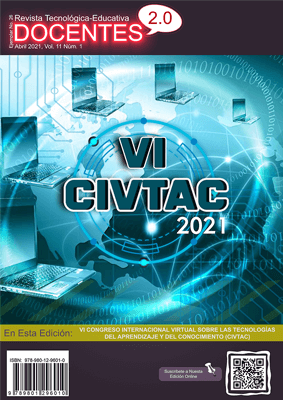On Digital Convergence in Education
 DOI:
https://doi.org/10.37843/rted.v11i1.211
DOI:
https://doi.org/10.37843/rted.v11i1.211
Main Article Content
Abstract
Based on the fundamental role of the teacher in education and considering that it is said that teachers teach solutions, it falls into a wrong belief. This COVID-19 pandemic has revealed such a marked digital divide existing in educational environments and the need for the implementation of innovative learning strategies, mediated by basic but functional technological tools, that allow mediation between knowledge and its actors. The objective of this proposed research was to analyze, based on the use of technologies in learning environments. The categories that consider the dynamic role in teaching and turn a reflective practice-oriented to the digital competencies of the level Elementary School of the IE Telepalmeritas, Municipality of San Luis de Gaceno, Department of Boyacá. In this case, for the development of the study, the qualitative research methodology is used, with a descriptive approach, based on the semi-structured interview protocol. It then found that it should be committed to meaningful learning based on experiences and interactions with digital tools from teachers to be multiplied in the classroom, promoting autonomous learning through responsible digital practices.
Downloads
Metrics
Article Details

This work is licensed under a Creative Commons Attribution-NonCommercial-NoDerivatives 4.0 International License.
Those authors who have publications in our journal accept the following terms:
- When a work is accepted for publication, the author retains rights of reproduction, distribution of his/her article for exploitation in all countries of the world in the format provided by our magazine and any other magnetic medium, optical, and digital.
- Authors will retain their copyright and guarantee the journal the right first to publish their work, which will be simultaneously subject to the Creative Commons Acknowledgment License (Attribution-NonCommercial-NoDerivatives 4.0 International (CC BY-NC-ND 4.0)). That allows third parties to copy and redistribute the material in any medium or format, under the following conditions: Acknowledgment - You must properly acknowledge authorship, provide a link to the license, and indicate if any changes have been made. You may do so in any reasonable way, but not in a way that suggests you have the licensor's endorsement or receive it for your use. NonCommercial - You may not use the material for a commercial purpose. NoDerivatives - If you remix, transform, or build from the material, you cannot broadcast the modified material. There are no additional restrictions - You cannot apply legal terms or technological measures that legally restrict you from doing what the license allows.
- Authors may adopt other non-exclusive license agreements to distribute the published version of the work (e.g., deposit it in an institutional archive or publish it in a monographic volume) provided that the initial publication in this journal is indicated.
- Authors are allowed and recommended to disseminate their work through the Internet (e.g., in institutional telematic archives, repositories, libraries, or their website), producing exciting exchanges and increasing the published work's citations.
- Request of withdrawal an article has to be done in writing by the author to the Editor, becoming effective after a written response from the Editor. For this purpose, the author or authors will send correspondence via e-mail: [email protected].
- The author will not receive financial compensation for the publication of his work.
- All Docentes 2.0 Journal publications are under the Open Journal System (OJS) platform at: https://ojs.docentes20.com/.
References
Alvarado, J., Castellanos, L., & Mónica, G. (2017). Aprendizaje significativo en la docencia de la educación superior. XIKUA Boletín Científico de la Escuela Superior de Tlahuelilpan. DOI: https://doi.org/10.29057/xikua.v5i9.2239
Àlvarez, A. (2011). Análisis de la motivación en un contexto 2.0 de trabajo colaborativo. https://dialnet.unirioja.es/servlet/articulo?codigo=5348581
Alves, G., Fijaldo-Blanco, Á., & Sein-Echaluce, M. L. (2017). Comportamientos tecnológicos en la innovación educativa. https://www.sciencedirect.com/science/article/abs/pii/S0747563216307981
Alzate, F., & Castañeda, J. (2020). Mediación pedagógica: Clave de una educación humanizante y transformadora. Una mirada desde la estética y la comunicación. Revista Electrónica Educare.
Aparici, R. (2009). Pedagogía digital. https://www.researchgate.net/publication/228690655_Pedagogia_Digital DOI: https://doi.org/10.15603/2176-1043/el.v12n19p80-94
Assael, C., Baeza, A., & Marco, V. (2018). Conversación y mediación del aprendizaje en aulas de diversos contextos socioculturales. Perfiles educativos, 40 (160), 101-119. ISSN 0185-2698.
Bárcenas, C. (2013). Aproximaciones al estudio de la Convergencia Cultural. https://dialnet.unirioja.es/servlet/articulo?codigo=4990108
Bazán, D., & González, L. (2007). Autonomía profesional y reflexión del docente: Una resignificación. https://www.redalyc.org/pdf/2431/Resumenes/Abstract_243117032004_2.pdf
Bernal, C., & López, M. (2016). La cultura digital en la escuela pública. Revista Interuniversitaria de Formación del Profesorado, https://www.redalyc.org/jatsRepo/274/27446519010/html/index.html.
Bonilla, L., Cardona, L. M., Londoño, E., & Trujillo, L. D. (2008). Banco de la República. https://repositorio.banrep.gov.co/handle/20.500.12134/9560
Buitrago, R., & Lucia, H. (2015). Educación rural en Boyacá, fortalezas y debilidades desde la perspectiva del profesorado. Scielo, 169-190.
Cardenas, I. (2013). Criterios para seleccionar tecnologías educativas y estrategias didácticas en el Colegio Guillermo León Valencia. https://revistas.uptc.edu.co/index.php/educacion_y_ciencia/article/view/3239
Cataño, G. (2015). Educación y mundo rural. El caso de Boyacá. https://ideas.repec.org/b/ext/public/71.html
Cobo, C. (2016). La innovación pendiente reflexiones (y provocaciones) sobre educación, tecnología y conocimiento. https://digital.fundacionceibal.edu.uy/jspui/bitstream/123456789/159/1/La_innovacion_pendiente.pdf
Cuevas, O., Navarro, L., & Jaime, M. (2017). Metaanálisis sobre educación vía TIC en México y América Latina. Revista electrónica de investigación educativa, 10-19.
Da Costa, C., & Sarasola, M. (2016). Evaluando el liderazgo educativo centrado en los aprendizajes del alumnado. Scielo. https://dx.doi.org/10.18800/educacion.201602.007Cuevas, O., Navarro, L., & Jaime, M. (2017). Metaanálisis sobre educación vía TIC en México y América Latina. Revista electrónica de investigación educativa, 10-19.
Espinel, Y. (2011). Protocolo de entrevista. Semillero Desarrollo, políticas públicas y anticorrupción (DPPA). Investigación sobre PNIE y FFIE en Bogotá y Cundinamarca.
Fondón, I., Madero, M., & Sarmiento, A. (2010). Principales Problemas de los Profesores Principiantes en la Enseñanza Universitaria. Formación universitaria, 21-28. DOI: https://doi.org/10.4067/S0718-50062010000200004
Mineducación. (2019). Plan Estratégico de Tecnologías de la Información 2019/2022. https://www.mineducacion.gov.co/1759/articles-362792_galeria_11.pdf
Molina, B. (2019). El quehacer del maestro y la formación docente en la escuela rural multigrado. UPTC: https://repositorio.uptc.edu.co/bitstream/001/2728/1/TGT_1368.pdf
Rodriguez, S. (2018). Las TIC como mediación didáctica en procesos de enseñanza. https://repositorio.uptc.edu.co/bitstream/001/3138/1/TGT_1686_Tics_como_mediacion.pdf
Salgado, A. (2007). Investigación cualitativa: Diseños, evaluación del rigor metodológico y retos. 71-78. Scolari, C. (2010). Convergencia, medios y educación. https://repositori.upf.edu/bitstream/handle/10230/27098/Scolari_RELPE_Conv.pdf?sequence=1






